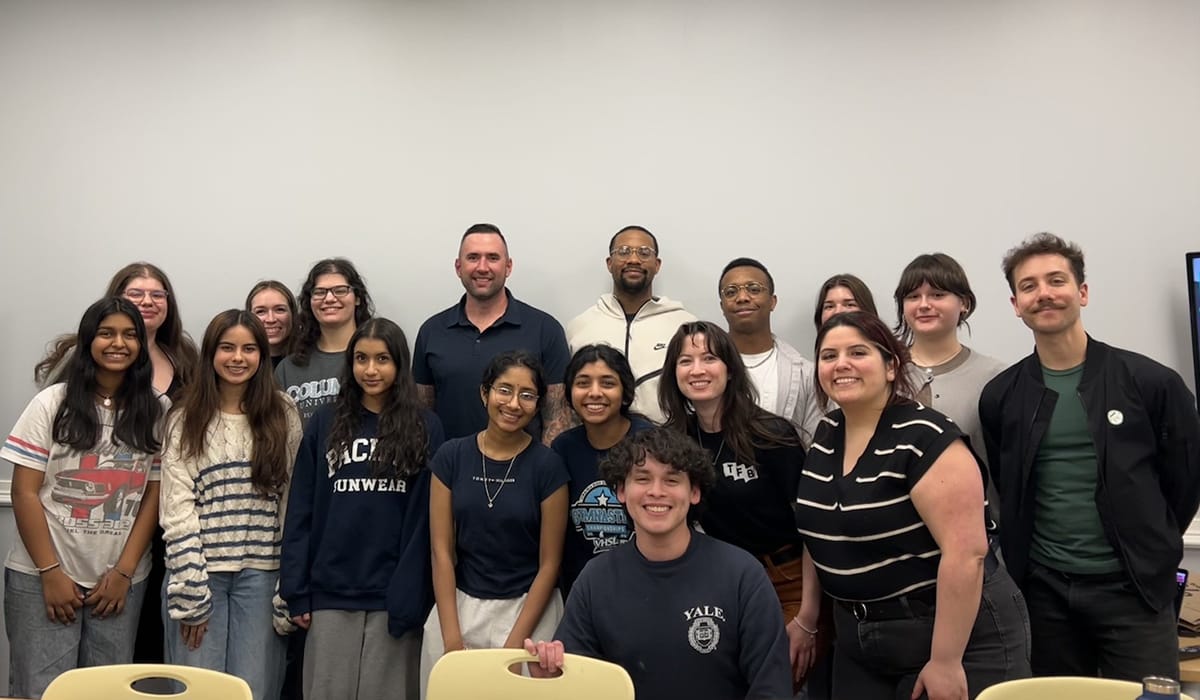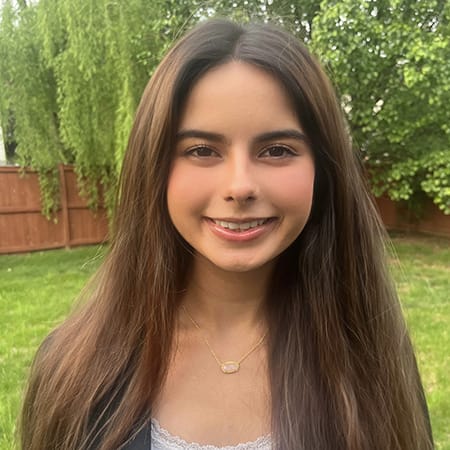Creating Space for Voices to Be Heard

Meet Daily Point of Light Award honoree Saniya Yamin. Read her story, and nominate an outstanding volunteer or family as a Daily Point of Light.
Public policy affects everyone’s daily life. But what happens when you don’t have a seat at the proverbial table where decisions are made? This was a question 17-year-old Saniya Yamin, founder of PIVOT, a youth-led think tank and advocacy organization, didn’t like the answer to.
Growing up just outside Washington, D.C., Saniya has long had an interest in politics. Her passion for travel—she’s been to nearly 50 countries—has also informed her worldview.
“We go to a lot of countries that are still developing, and I’ve spent a lot of time seeing how education systems affect youth in those countries and how they often aren’t given an active part in their country. Coming home, I’ve seen many of the same experiences in my own life,” she says.
Her policy experience grew through internships with multiple campaigns and, last year, as an elected youth representative to her county’s Board of Supervisors. The latter made a lasting impression, prompting her to wonder why more youth weren’t included in the conversations about policies directly affecting them. When you can’t vote, your voice is often lost in the fray.

Saniya noted legislators’ reluctance to meet with young people, even when they reach out. And, talking with friends, she realized it was universal. After soliciting stories online, she spoke with nearly 60 youth about issues in their communities, and in January 2025, along with co-founders Caleb Kurlantzick and Arthur Hu, she started PIVOT.
“Young people have really innovative ideas about policy and how we can attack the modern world in the future, and we bring fresh eyes to problems we face,” Caleb, now leading outreach, emphasizes.
Their goal is to teach youth to take a leading role in advocating for policies that touch their lives.
“It’s building policy understanding, so you can go into your community and figure out where the gaps are and what bills, laws or regulations can be put in place to fix that problem,” he says, calling it the idea to impact pipeline.
And it can all be done without a ballot. Now, there are 200 members across 30 US states and 15 countries, 100 of whom are part of their international fellowship. Saniya spends 40-50 hours a month directing the program.
“My work involves designing the structure, recruiting and mentoring fellows and ensuring that they have the resources, training and support to research and write high-quality policy briefs,” Saniya explains.
She leads the editorial process and connects fellows with policymakers to put their research into action. She also manages partnerships with over 15 civic and advocacy organizations while running PIVOT’s website and social media.
“She inspires the fellows and department heads by coming every day. She always makes sure to be there for everyone,” Caleb says. “She brings a very calming presence.”
One Rwandan fellow’s family was denying her access to higher education because of her gender and cultural norms. Saniya and PIVOT lent their support.
“We worked with her to use her journalism skills to publish articles and write emails to people local to her, and we supported her in starting an advocacy campaign to challenge gender discrimination within her community,” Saniya recalls, crediting funds won through the national MyImpact Challenge with providing fellows with seed money and grants to start independent initiatives.
Working with differing cultures, personalities and ideas, occasional conflict is inevitable, but it doesn’t have to be a roadblock. The bridges that have been built and friendships made have been rewarding results of her work.
Recently, Saniya spearheaded NextGen Civic Academy, a two-week global summit with top policymakers and advocacy organizations talking about their roles and strategies. 100 students from 30 countries learned about policy writing, media strategy and civic action while doing issue research for a pitch competition.
“We gave out $1,000 to our first prize winners, two women from Gaza working on an in-person program,” Caleb adds.
Saniya has taken on an independent initiative as well, working with her local legislator to write a bill and find funding for all high school juniors in Virginia to take the SAT for free during school hours. Currently, students spend $60 and take it on the weekend. Her proposal comes from successful models being used in more than 10 other states.
“Small wins compound over time. Things like having one meeting or giving a student a micro grant can really shift their trajectory, not only in PIVOT, but in life,” she stresses. “The SAT and other tests are often the first barrier to higher education, and that’s something I’m passionate about solving,”
She has also published policy briefs on the issue through PIVOT.
In the long term, Saniya is focused on building partnerships and increasing outreach for completed policy briefs
“We hope to get every one of our writers into meetings with policymakers and partner organizations,” she stresses. “We hope to provide them with the materials to communicate their ideas effectively and to speak publicly about the issues they’ve been working on.”
When it comes to volunteering, Saniya suggests people start with an issue that bothers or inspires them. Then, she recommends learning more before joining people who are already working on it and setting achievable goals, like setting up a meeting or writing a short piece for a local paper.
“Don’t wait to feel ready to step into advocacy. You may never feel ready,” she says. “You just have to put yourself out there.”
For her own future, Saniya imagines a career as a policymaker or with a government job. She wants to be in a position of power to give youth and marginalized groups a voice in the decisions she makes.
“If you notice a voice missing from the table, it’s your job to make a space for it,” she emphasizes. “Youth aren’t just the leaders of tomorrow; we are the leaders today. We have the capacity to research, advocate and create solutions, but we need the access, the mentorship and the belief from adults that our voices matter, too.”
Do you want to make a difference in your community like Saniya? Find local volunteer opportunities.